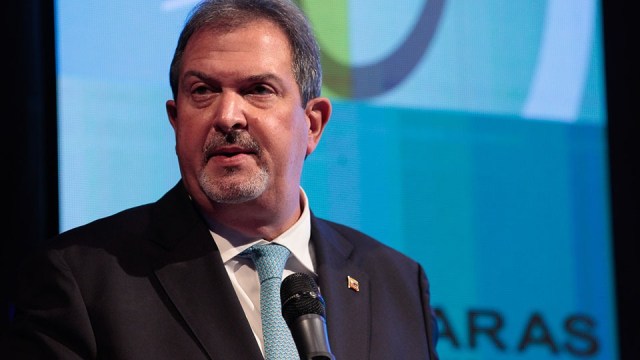
Adán Celis, First Vice President of Fedecámaras (Federation of chambers of commerce and industry) and aspiring to preside over the organization, as part of a national tour during a visit to Apure State with his team, held a meeting with members in Apure Cattlemen’s Association (Agapure), merchants and service providers affiliated with the Chamber of Commerce and Tourism of this plains state, with the intention of presenting their plan towards the elections of the new Fedecámaras Board of Directors, scheduled for July 20th and 21st of this year during the of Fedecámaras national assembly in Maracaibo.
By María Eugenia Díaz / Lapatilla.com Correspondent
In an interview with lapatilla.com, Mr. Celis celebrated the reopening of the border between Colombia and Venezuela, because the business community believes in economic freedom and, therefore, considers that closed borders bring along the separation of families and the fall of trade. However, he warns that balanced trade must be guaranteed in the border area, under equal conditions between both nations.
“Timid changes are taking place. We hope that the same conditions available for Colombia, are available for Venezuela. Some products arrive in Venezuela without any type of tariffs. But in Colombia a high tariff is exacted, in addition, records and phytosanitary regulations are needed. Given the differences in Venezuelan and Colombian regulations, an agreement must be reached in these procedures. Trade has to be balanced,” he stressed.
He objected that the trade balance is currently 90% in favor of Colombia compared to 10% of Venezuela. “It is not a win-win relationship. We are sure that the negotiations on Agreement 28 will balance trade and allow the entry of Venezuelan products into the Colombian market.”
Economic prospects
For Celis, last year the business sector started to enjoy the reopening process. This allowed the population a slight recovery, a turnaround in economic matters, because market forces have been allowed to do their job.
“It brought with it a lot of hope and joy that allowed investments to flourish timidly in some sectors. But unfortunately, the trade union leader considers that during the second half of the year, these expectations fell due to several factors, such as the implementation of the tax (Financial Transactions Tax or ITF), that hinder and slow down the investment processes In Venezuela”.
According to the union leader, the country’s economy was “moving” as the result of the transactional dollarization process, which allowed private investment and generated tranquility in the population. “… but towards the second semester a slowdown in wages occurred. This has continued during the first semester of 2023 and has been added to the fiscal voracity, the deterioration of the public services system. All of which have affected the productive apparatus and combined with smuggling has affected the business sector,” he stressed.
Fatal taxes
Despite this unfavorable outlook, Celis expresses the optimism of the business community and urges the authorities to correct these deviations to return to the path of recovery expectations, as occurred during the first half of last year.
Fiscal voracity, which is characterized as taxation that is excessive, that obviates the ability to pay and tends to appropriate the patrimony of taxpayers subjected to an irrational tax burden, threatens the development and continuity of economic activity.
The current candidate for the presidency of Fedecámaras proposes what he calls the application of the “Chevron model” for the recovery of the operation of public services in the country. In other words, just as the US company deals with the oil industry to recover production, the proposal focuses on the management of public services jointly between the private and public sectors.
Fedecamáras had estimated a growth of 4 to 5 percentage points during the first quarter of this year. “… but this has not happened. However, we are pointing to a recovery and growing back to that figure. This will depend on the implementation of a series of economic measures and a legal framework that guarantees the establishment of companies in the country and allows Venezuela to change an “Extractive” model for a Productive Venezuela so that more investments come, jobs are created and the income of Venezuelans is recovered.
In Celis’ opinion, the drop in production is being felt in all sectors of the country. “Especially in the construction sector, the retail sector, while the tourism sector has varied results, since some areas are very depressed, while in others some recovery is observed. It is also complex for the industrial sector because Conindustria reported a 3% drop in production due to smuggling. Some stability is observed in the food sector,” he pointed out.
Recognition to entrepreneurs
Celis urges the authorities to lower the ITF to its minimum expression, control illegal imports, establish competitive and fair tariffs with Colombia and Brazil, and regulate fiscal voracity.
“The Tax on Financial Transactions or ITF is a tax that you pay every time you carry out operations in national or foreign currency. The rate of this tax is 0.005% of the total value of the operation you carry out.”
The vice president of Fedecámaras took the opportunity to congratulate the businessmen of Apure State who, despite the difficulties, believe and continue to bet on the development of this plains state. He also extended his congratulations to the ranchers of the Apure State, who show their will and their roots in the countryside to continue producing quality food and products, generating jobs, economic and social mobility.
Celis was accompanied on this tour by Tiziana Polesel, professor and former president of Consecomercio, who aspires to become the Second Vice President of Fedecámaras. Ms. Polesel is the first woman in 20 years to join the Executive Committee of Fedecámaras, which attests to the work of women for the country in the business and academic fields.

